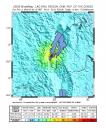For those looking for the joint assessment by the Bureau of Meteorology and the CSIRO that’s all over the news at the moment, you can find it on the MAFF website. There is also a web page listed for the data and analysis in the report, but it’s not working yet (I guess they forgot the webmaster doesn’t work on weekends).
It’s about 35 pages long and is fairly technical, but not overly daunting. The content, however, is pretty scary. For us in Victoria is it predicting:
- by 2010-2040, exceptionally hot years are likely to affect about 75% of the region, and occur every 1.3 years on average;
- by 2010-2040, exceptionally low rainfall years are likely to affect about 10% of the region and occur about once every 12 years on average;
- by 2030, exceptionally low soil moisture years are likely to affect about 11% of the region and occur about once every 9 years on average.
Historically it says that Victoria and Tasmania are down 109 mm in rainfall since 1950 and average temperature is up by almost 0.8C over the same 50 year timescale.
The most worrying thing is that these predictions are based on a lower level of CO2e emissions than we are currently tracking towards.
Observations since 1990 show that we are tracking the highest IPCC emission scenario, called A1F1, but climate simulations have not been performed using the A1FI scenario. Most climate research institutes around the world did simulations using the mid-range emission scenarios, called A1B and A2. Hence, in this report, projections for the next 20 to 30 years are based on simulations using mid-range emission scenarios.
So if we carry on how we’re doing now, then the reality could be much worse..
